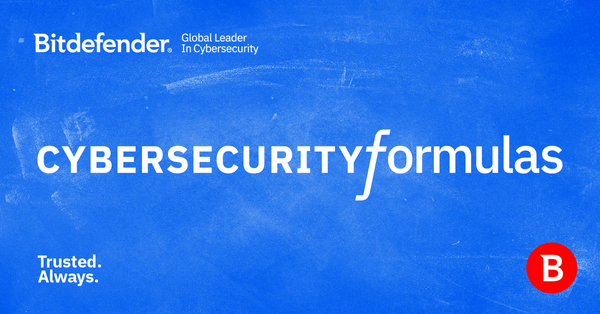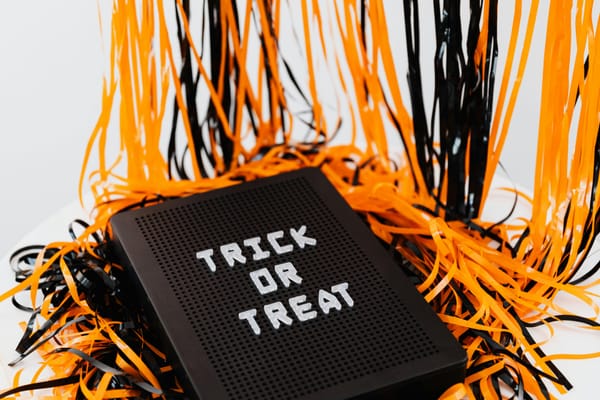Bitdefender Cyber-Formulas: Use Your Problem-Solving Skills to Strengthen Your Digital Security This Cybersecurity Awareness Month

Your online safety shouldn’t be left to chance; it needs cohesive, straightforward, and timely applied formulas for success.
In many aspects, cybersecurity is like math. It involves problem-solving, key precision, and logic to create tried-and-true formulas that can keep you safe in the digital world.
This Cybersecurity Awareness Month, we’re breaking down solutions to the most important cybersecurity equations in three main areas: online scams, ransomware, and passwords.
Online Scams
Every year, consumers lose billions of dollars to online scams. These scams are designed to manipulate your trust – whether it’s a romance, phishing, or shopping scam. For example, romance scams alone caused over $1.10 billion in losses in 2023, with the median victim losing $2,000 according to the FTC.
Over the years, scammers have crafted a deceptively simple formula: they exploit your trust and use social engineering tricks to steal your money or data. This formula has been refined through trial and error, adapting to the digital landscape and our consistent reliance on technology.
Despite its simplicity, the scam formula is highly effective. Why? Because it leverages fundamental human behaviors—trust, curiosity, and fear. Just like a basic math formula that delivers consistent results, this scam equation remains alarmingly successful – thus the billion-dollar paycheck.
Cyber-Formula to Stay Safe Against Online Scams
- Eliminate the unknowns: You need to think of unsolicited emails and messages as unknown variables in an equation. Don’t open attachments or links from unknown senders, as they may contain malware or direct you to phishing websites designed to steal your information.
Example: An unsolicited email from your “bank” asks you to verify your account. Upon closer inspection, the email domain doesn’t match the official one, a huge red flag signaling a scam. Recognizing this prevents the scam equation from working against you.
- Reduce sharing private information to zero: The more personal information you share, the more scammers and hackers will have to work with. Whether it's via social media, email, or direct messaging apps, never give out sensitive information like passwords, social security numbers, or bank details.
- Subtract malware from the equation: Malware is a primary tool used by hackers and scammers to take control of your devices, steal data and take over accounts. Always download apps from trusted sources, and never from ads you see on social media platforms or other third-party websites.
Example: You install an app from a website offering free music downloads and unknowingly introduce a credential-stealing Trojan onto your system, compromising both your privacy and the security of your accounts and data.
Ransomware
Ransomware is one of the most disruptive threats in cybersecurity. It boils down to a type of malware that locks down your data with hackers demanding payment to unlock it. And if you think you’ve found an easy way out to solve the problem by paying ransom, we urge you to think again.
Paying ransom is always a gamble - never a guaranteed solution. Like a probability problem in mathematics, the outcome is uncertain, and paying doesn’t necessarily mean you’ll get your data back.
The good news? Much like math problems, ransomware attacks can be avoided by preparing and following a few key steps. The cost of not following this "formula" can be devastating, but the solution is simple if you know where to look.
Cyber-Formula to Help You Fend Off Ransomware Attacks
What if you could stop a ransomware attack before it happened and never worry about paying for something (recovery of your data) you only have a 1 in 2 chance of getting?
Here are some key tips:
- Avoid the ransomware triangle: Ransomware will often enter a computer system through one of three key entry points: unsolicited email attachments, untrustworthy links, and suspicious downloads. Emails may appear to come from a trusted source — a colleague, your bank, or even a government agency—urging you to open the attached file. Avoiding these is the first step in protecting yourself.
Example: A ransomware email might pretend to be from a trusted company and ask you to open an attachment, which then infects your system. Look for red flags such as unusual language, misspellings, or requests that seem out of place. By not interacting with these elements, you break the ransomware equation.
- Back up your data regularly: Even with strong defenses, no system is entirely invulnerable. Regular backups are your safety net—if ransomware does strike, you’ll have clean copies of your files to restore. Automated backup solutions take the hassle out of this process, keeping your data safe without constant manual effort.
- Expand your safety perimeter: The best defense against ransomware and other malware is a comprehensive cybersecurity solution. A multi-layered security approach that includes firewalls, antivirus software, and scam-fighting tools that help you detect threats in real time.
Passwords: The Formula for Strong Digital Security
Passwords are the first line of defense in securing your digital world. However, many people continue to create weak or easily guessable passwords and completely ignore basic password rules. The reasons are simple: convenience, familiarity, and the belief that they won’t be targeted.
For example, 37% of netizens admit to writing down their passwords, leaving them vulnerable if those notes fall into the wrong hands. 18.7% use the same password for three or more accounts, and 15.8% use the same password across at least two accounts. These statistics, according to Bitdefender’s 2024 Consumer Cybersecurity Assessment Report, reveal how common it is to prioritize convenience over security, creating openings for hackers and other malicious actors to exploit.
If your password is your birthday, you’re giving your account to hackers, as a present. This is especially true considering how much personal information, including your birthdate, is already available – on your social media account, for example.
The good news is that creating strong, unique passwords for each account is one of the simplest, most effective ways to block hackers.
Now let’s break down the formula for strong password security:
- Make your password as complex as possible: A simple password, like “password123” or your birthdate, can be cracked in less than a second. However, a 12-character password with a mix of upper- and lowercase letters, numbers, and special symbols would take over 200 years to crack.
Example: A user with the password "abcd1234" is far more vulnerable than someone using a complex, randomized password like “T9x!7Vz&21C”.
2. Use unique passwords for every account: Reusing passwords across multiple accounts is like using the same key for all your locks. If one account is compromised, all your accounts are at risk. By using different passwords for each, you limit the damage a hacker can do in case you’re a victim of a data breach or leak.
Example: If a hacker gains access to your social media account because of poor password hygiene and you’ve used the same password for your online banking account, the hacker can easily compromise that account as well. Using a password manager to generate unique passwords for each account simplifies this task.
- Enable two-factor authentication (2FA): Two-factor authentication adds another layer of protection, securing your login process. But most importantly, it makes it much harder for threat actors to take over your accounts even if they have your password.
Just like in mathematics, where applying the correct formula solves even the most complex problems, cybersecurity relies on proven formulas to protect you in the digital world. Whether it’s safeguarding yourself from online scams, defending against ransomware, or creating strong passwords, the right approach can make all the difference.
Bitdefender Premium Security offers all the key ingredients to solve the cybersecurity equations discussed throughout this article.
- Advanced Protection Against Online Scams: Bitdefender’s comprehensive anti-phishing and anti-fraud features automatically block malicious websites, fake login pages, and phishing attempts. This removes the guesswork from identifying scam emails and suspicious links, keeping you safe from social engineering traps.
But there’s more: In addition to our web protection features that secure your browsing, email protection that guards against phishing attempts, and Scam Alert to fend off scams targeting mobile devices, we’ve also expanded our scam-fighting trifecta with Scamio.
If you suspect someone is trying to scam you, or a website looks suspicious, check it with Scamio, our AI-powered scam detection tool. Send any texts, messages, links, QR codes, or images to Scamio, which will analyze them to determine if they are part of a scam. Scamio is free and available on Facebook Messenger, WhatsApp, and your web browser. You can also help others stay safe by sharing Scamio with them in France, Germany, Spain, Italy, Romania, Australia, and the UK.
- Ransomware Defense: Bitdefender includes multi-layered ransomware protection, which prevents unauthorized changes to your files and ensures that your data is backed up and secure. Its ransomware remediation feature also automatically restores your files if an attack occurs, breaking the ransomware triangle before it can do any damage.
- Password Strength and Management: Bitdefender offers a handy cross-platform Password Manager that allows you to generate and store strong, unique passwords for every online account. This eliminates the need to remember or write down passwords while keeping them safe from hackers.
tags
Author
Alina is a history buff passionate about cybersecurity and anything sci-fi, advocating Bitdefender technologies and solutions. She spends most of her time between her two feline friends and traveling.
View all postsRight now Top posts
How to Protect Your WhatsApp from Hackers and Scammers – 8 Key Settings and Best Practices
April 03, 2025
Outpacing Cyberthreats: Bitdefender Together with Scuderia Ferrari HP in 2025
March 12, 2025
Streamjacking Scams On YouTube Leverage CS2 Pro Player Championships to Defraud Gamers
February 20, 2025
How to Identify and Protect Yourself from Gaming Laptop Scams
February 11, 2025
FOLLOW US ON SOCIAL MEDIA
You might also like
Bookmarks






